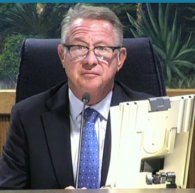President Biden also laid out proposed future reforms, including a Constistutional amendment to limit presidential immunity, tax reforms, and term limits for Supreme Court justices
By Miriam Raftery
Hear audio of President Biden’s farewell address; view video, read transcript
January 19, 2025 (Washington D.C.) – In his farewell address to the nation delivered in the White House oval office on January 15, President Joe Biden issued a warning reminiscent of the farewell speech delivered by President Dwight Eisenhower in 1961.
“Today, an oligarchy is taking shape in America of extreme wealth, power and influence that literally threatens our entire democracy, our basic rights and freedoms, and a fair shot for everyone to get ahead,” President Biden said. Specifically, he cited “the concentration of technology, power and wealth” and warned of “dangerous consequences if their abuse of power is left unchecked.”
President-elect Donald Trump, who will be inaugurated tomorrow, has surrounded himself with wealthy tech company executives, drawing controversy. There are parallels to the Russian oligarchs who wield undue influence over Russia’s president Vladimir Putin and have profited from his reign, while supporting his policies.
Council asks staff to revise resolution, which will be on the agenda January 28
By Miriam Raftery
 "I see this as disrespectful from you, the Council, the Mayor and the attorneys...This is going to create a lot of distrust in the community.” -- Jose Cruz, photo, left
"I see this as disrespectful from you, the Council, the Mayor and the attorneys...This is going to create a lot of distrust in the community.” -- Jose Cruz, photo, left
"It's about following the law. California is asking us to ignore federal law."--Mayor Bill Wells, photo, right
January 17, 2025 (El Cajon) – In emotional testimony, leaders of the Latino community and others pleaded with El Cajon City Council members on January 14 to reject a resolution proposed by Mayor Bill Wells aimed at maximizing the city’s cooperation with federal immigration authorities. With President-Elect Donald Trump’s announced mass deportation intent, which Trump has said could include all undocumented immigrants in the U.S., many speakers voiced fears over potential discrimination by police against people of color, as well as fears that even long-term immigrants and children who have committed no crimes could be rounded up for deportation.
Trump has also said he wants to deport some special protection status immigrants who came here legally, such as Haitians; others with TPS status include Afghans and Iraqis who helped the U.S. military, Ukrainian refugees, and others.
Photo, left to right: Councilmembers Lauren Cazares and Patricia Dillard, Mayor Mark Arapostathis, Councilmembers Laura Lothian and Genevieve Suzuki
Source: City of La Mesa
January 10, 2025 (La Mesa) – The City of La Mesa welcomed two new councilmembers during its City Council meeting on Tuesday, Dec. 10. The occasion marked a historic milestone in La Mesa as the council now consists of a majority of women, including women of color, with four women and one man who serves as mayor.
“This is a proud and historic moment for La Mesa,” said Mayor Mark Arapostathis. “Our City Council reflects the strength and diversity of our community. I look forward to working alongside my colleagues to continue making La Mesa a place where everyone feels represented and empowered.”
Joining the council are the newly elected members, Lauren Cazares and Genevieve Suzuki. Both Cazares and Suzuki have deep roots in the La Mesa community. Cazares, lifelong La Mesan, currently serves as Policy Advisor at the San Diego Regional Chamber of Commerce and has been actively involved in various boards and committees, including the City of La Mesa Community Police Oversight Board.
By Miriam Raftery
January 8, 2025 (La Mesa) – Dozens of public speakers at yesterday’s Grossmont Healthcare District meeting urged the board to move its 9 a.m. meetings to evenings in order to accommodate people with full-time jobs. The proposal was made by newly elected director Nadia Farjood, a working mother who says her new full-time job at the District Attorney’s office prevents her from attending daytime meetings.
The district represents about 520,000 residents. Around 271 people signed a petition in support of Farjood’s proposal, and around 40 showed up in support at yesterday’s meeting. But despite testimony from union representatives, healthcare workers, district residents and local elected officials, Farjood’s proposal failed, with no other director in support.
Some speakers voiced concern not only for Farjood, but for the potential chilling effect on would-be candidates who may be persuaded from running for office if they have full-time day jobs.
East County News Service
January 6, 2025 (La Mesa) – Tomorrow at 9 a.m., the Grossmont Healthcare District board of directors will consider a proposal by newly elected board member Nadia Farjood to change the board’s meeting times to evenings or weekends. But a survey of board members shows no support for that plan. The board previously experimented with holding evening meetings but found that attendance by the public dropped, multiple members noted.
Farjood, an attorney, has said that her day job prevents her from attending any meetings Monday through Friday between 7:30 a.m. and 6 p.m., when she has court appearances, as well as from 6 to 9 p.m. on the second and third Tuesdays each month.
